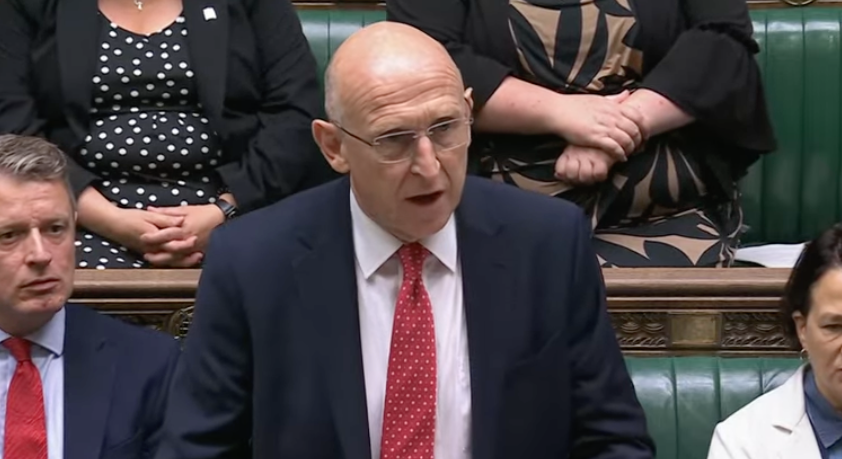The Ministry of Defence official responsible for a catastrophic data leak which put the lives of up to 100,000 Afghans at risk still works for the government, it has emerged.
The major breach happened in February 2022 after a member of the armed forces inadvertently shared a spreadsheet containing the names of thousands of people who said they were in danger from the Taliban and had applied for sanctuary in Britain.
The leak, which came to light when someone threatened to publish the whole list on Facebook, prompted thousands of Afghans to be evacuated to Britain under a top secret resettlement scheme which the government projected to cost billions. The details of the leak, and the subsequent evacuation, have been kept under wraps for almost two years as the result of an unprecedented superinjunction.
Now it has emerged that the official behind the leak has not been fired for the blunder. Asked whether the serviceman was still employed by the government, defence secretary John Healey told the News Agents Podcast: “They are no longer doing the same job on the Afghan brief.”
Asked for a second time whether the official was still employed by the government, Mr Healey refused to be drawn on the matter.
Instead, he added: “This is bigger than the actions of a single individual.
“For me as defence secretary now in this government, my biggest concern and my first focus coming into government was to try and get a grip of something that was entirely unprecedented”.
Journalist Lewis Goodall asked for a third time whether the person is still a government employee and the defence secretary again avoided answering. Pushed for a fourth time, he responded: “I’m actually not going to get into the personnel matters”.
Asked yet again, he went on: “My first priority was not trying to conduct some sort of witch hunt on the defence official that released the spreadsheet that caused this profound data loss.
“My argument to you is that accountability can start today, accountability in due course, as the facts of this are properly scrutinised and examined that will come.”
Mr Goodall told Mr Healey that “we can assume on the basis of your answers that noone has been fired”. When The Independent asked the MoD to clarify whether the serviceman was still employed by the government, a spokesperson said there was nothing to add.
In a statement on Tuesday, the Information Commissioner’s Office said the body had decided “no further regulatory action is required at this time in this case”.
The database contained 33,000 records and the confidential information of over 18,700 applicants to the Ministry of Defence’s Afghan resettlement scheme (Arap). It contained email addresses and phone numbers of applicants, as well as their father’s names and their case status.

It also included the names of some British government officials.
It is understood that the unnamed official emailed the dataset while trying to verify information about the applications, believing the dataset to only have around 150 rows.
The MoD only became aware of the breach more than a year after the release, when excerpts of the dataset were anonymously posted onto a Facebook group in August 2023, with officials fearing those affected by the breach could be at risk of harassment, torture or death if the Taliban obtained their data.
An unprecedented superinjunction was made at the High Court in September 2023 to reduce the risk of alerting the Taliban to the existence of the data, which banned any news about the leak being published or the order itself being discussed. The Independent was among the publications injuncted after finding out about the leak through investigations into the UK’s resettlement schemes.
Ministers went on to create a secret Afghan relocation scheme – the Afghanistan Response Route – in a bid to help covertly relocate more than 16,000 Afghans to the UK. Around 8,000 more Afghans are still due to arrive in Britain.
Asked about the next steps, Mr Healey said that influential committees of MPs, such as the defence select committee, should “absolutely” launch an “in depth inquiry” in to what had happened.
He said he thought he would have been “very, very unlikely” to have taken out a superinjunction if he had been in position at the time the data breach was discovered.
Senior MPs have warned about the precedent set by the super injunction to cover up the data breach. Former Tory leader Sir Iain Duncan Smith said: “I am concerned the super injunction was applied as that is peculiar, it stopped any free speech or examination in Parliament and we are still none the wiser as to who was responsible or why it happened.”
The superinjunction, lifted on Tuesday, is thought to be the longest lasting order of its kind and the first time the government has sought such a restrictive measure against the media.
Ben Wallace takes ‘complete responsibility’ for Afghan leak — but defends injunction
MoD data leak that put up to 100,000 lives at risk revealed as superinjunction lifted
Former defence secretary Ben Wallace makes ‘no apology’ for Afghan injunction
When Britain’s allies risked their lives, we abandoned them – and hushed it all up
Driver accused of running over world’s oldest marathoner Fauja Singh arrested
Vegan charity advert banned after featuring baby being taken from mother







